-
 Bitcoin
Bitcoin $117500
-0.28% -
 Ethereum
Ethereum $3558
0.05% -
 XRP
XRP $3.392
-1.64% -
 Tether USDt
Tether USDt $1.000
-0.04% -
 BNB
BNB $728.3
-0.65% -
 Solana
Solana $175.4
-0.82% -
 USDC
USDC $0.9998
-0.01% -
 Dogecoin
Dogecoin $0.2398
1.83% -
 TRON
TRON $0.3179
-2.38% -
 Cardano
Cardano $0.8204
-0.07% -
 Hyperliquid
Hyperliquid $44.07
-0.62% -
 Stellar
Stellar $0.4581
-1.03% -
 Sui
Sui $3.790
0.35% -
 Chainlink
Chainlink $18.16
1.68% -
 Hedera
Hedera $0.2643
-0.28% -
 Avalanche
Avalanche $24.22
2.25% -
 Bitcoin Cash
Bitcoin Cash $512.2
-0.43% -
 Shiba Inu
Shiba Inu $0.00001479
0.54% -
 Litecoin
Litecoin $111.1
8.86% -
 UNUS SED LEO
UNUS SED LEO $8.986
0.08% -
 Toncoin
Toncoin $3.194
-0.68% -
 Polkadot
Polkadot $4.337
1.87% -
 Uniswap
Uniswap $10.02
-1.95% -
 Monero
Monero $321.7
1.05% -
 Ethena USDe
Ethena USDe $1.001
-0.04% -
 Bitget Token
Bitget Token $4.870
0.73% -
 Pepe
Pepe $0.00001325
1.35% -
 Dai
Dai $0.9999
0.00% -
 Aave
Aave $314.1
-2.09% -
 Cronos
Cronos $0.1203
1.58%
How are fees calculated for an ETH ETF?
ETH ETF fees include management, custody, and operational costs, typically ranging from 0.25% to 1.5% annually, impacting long-term investor returns.
Jul 09, 2025 at 01:14 pm
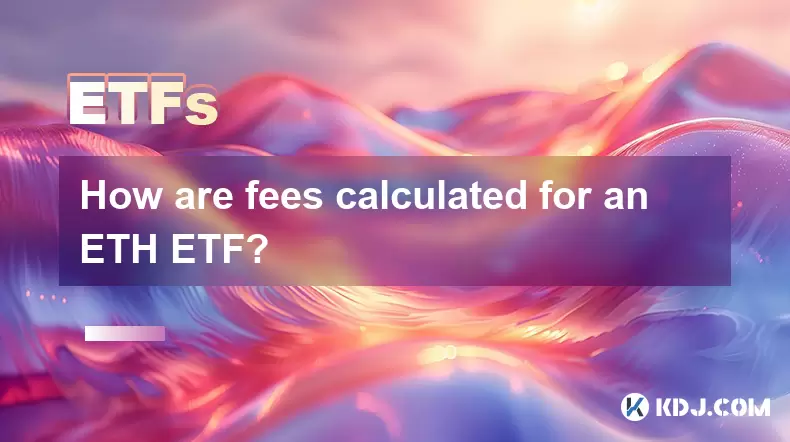
Understanding the Structure of ETH ETF Fees
The calculation of fees for an Ethereum Exchange-Traded Fund (ETH ETF) involves several components that collectively determine how much investors pay to hold and trade the fund. Unlike direct cryptocurrency ownership, ETFs are traditional financial instruments that track the price of Ethereum without requiring users to manage private keys or wallets. The fee structure is crucial because it affects long-term returns.
Asset management fees, often expressed as a percentage of assets under management (AUM), form the core component of ETF costs. These fees compensate the fund provider for managing the fund’s exposure to ETH. They typically range from 0.25% to 1.5% annually, depending on the issuer and the complexity of the underlying strategy.
Another key element is the custody and storage cost, which arises due to the need to securely store the actual Ethereum backing the ETF shares. While physical custody may not apply directly in some synthetic structures, custodial arrangements still involve fees, especially when third-party institutions are involved.
Breakdown of Operational Expenses in ETH ETFs
Beyond management fees, operational expenses play a significant role in the overall cost of an ETH ETF. These include administrative costs, regulatory compliance fees, and trading expenses incurred during rebalancing or adjustments to the fund's holdings.
For example, rebalancing costs occur when the fund adjusts its Ethereum reserves to maintain accurate tracking of the asset’s market price. This process may involve buying or selling ETH on exchanges, which can generate transaction fees, slippage, and bid-ask spreads. These indirect costs are absorbed by the fund but ultimately impact investor returns.
Additionally, licensing fees might be charged if the ETF uses proprietary indexes or methodologies to calculate the value of the fund. These fees are usually minimal but should be considered when evaluating total expense ratios (TER).
The Role of Trading Costs and Brokerage Commissions
Investors purchasing shares of an ETH ETF through brokerage platforms may encounter trading commissions and bid-ask spreads, which are separate from the fund’s internal expense ratio. These costs depend on the broker and the platform used to execute trades.
Some brokers now offer commission-free trading, reducing entry barriers for retail investors. However, the bid-ask spread remains a hidden cost that varies with market liquidity. A wider spread means higher execution costs, particularly during volatile periods when Ethereum prices fluctuate rapidly.
Furthermore, market maker fees are sometimes embedded into the ETF’s pricing mechanism. Market makers provide liquidity to ensure smooth trading of ETF shares, and their compensation can indirectly affect the net asset value (NAV) per share.
Taxation and Regulatory Compliance Charges
Regulatory oversight introduces another layer of cost for ETH ETF providers. Compliance-related expenses include audit fees, legal consultations, and reporting obligations required by financial authorities such as the SEC in the United States or ESMA in Europe.
In jurisdictions where capital gains tax applies to ETF transactions, tax advisory services may also contribute to operational costs. These services help investors understand their tax liabilities based on realized gains within the fund.
Moreover, reporting and disclosure requirements necessitate regular filings and transparency measures, which add to the fund’s administrative burden and are reflected in the overall expense structure.
Pass-Through Costs and Indirect Fee Impacts
Some ETH ETFs incorporate pass-through costs related to futures contracts or derivatives used to gain exposure to Ethereum. If the fund follows a futures-based model rather than holding spot ETH, roll costs and contango effects can influence performance and increase effective expenses over time.
These pass-through costs aren’t always clearly itemized in prospectuses but manifest through lower returns compared to direct ETH ownership. Investors should carefully review the fund’s methodology and assess whether it aligns with their investment goals and cost expectations.
Additionally, third-party service fees—such as those charged by index providers or data vendors—are often included in the total expense ratio. While seemingly minor, these fees accumulate over time and reduce net returns.
Frequently Asked Questions About ETH ETF Fees
What is the difference between management fees and total expense ratios in ETH ETFs?
The management fee specifically covers the cost of managing the fund, while the total expense ratio (TER) includes all operating expenses, such as custody, administration, compliance, and licensing fees. TER gives a comprehensive view of the annual cost investors bear.
Do I have to pay fees even if the ETH ETF loses value?
Yes, annual expense ratios are deducted regardless of the fund’s performance. Even if the ETH ETF declines in value, investors continue to incur management and operational fees, which are subtracted daily from the fund’s net asset value.
Are there ETH ETFs with no management fees?
Currently, most ETH ETFs charge management fees due to the costs associated with custody, compliance, and tracking. However, some providers may offer promotional waivers or discounted rates during initial launch phases to attract investors.
How do I compare fees across different ETH ETF products?
Investors should examine the total expense ratio (TER) listed in the fund’s prospectus and compare it against similar offerings. Additionally, reviewing tracking error, liquidity, and underlying exposure mechanisms provides a more holistic understanding of potential costs and performance differences.
Disclaimer:info@kdj.com
The information provided is not trading advice. kdj.com does not assume any responsibility for any investments made based on the information provided in this article. Cryptocurrencies are highly volatile and it is highly recommended that you invest with caution after thorough research!
If you believe that the content used on this website infringes your copyright, please contact us immediately (info@kdj.com) and we will delete it promptly.
- SUI Altcoin: Primed for Potential 100x Gains?
- 2025-07-20 04:50:12
- Bitcoin Halving, Macro Drivers, and Tim Draper: A Perfect Storm?
- 2025-07-20 05:30:12
- Panicked, Child, Swallowed Coin: A Parent's Worst Nightmare (and What to Do)
- 2025-07-20 04:35:12
- Binance Coin (BNB) Price Prediction: Resistance Break Signals Bullish Momentum
- 2025-07-20 05:30:12
- XRP Soars to Seven-Year High: Is This the Real Deal?
- 2025-07-20 05:50:12
- WLFI Token Tradability: World Liberty Finance's Bold Move Under Trump's Crypto Wing
- 2025-07-20 04:50:12
Related knowledge
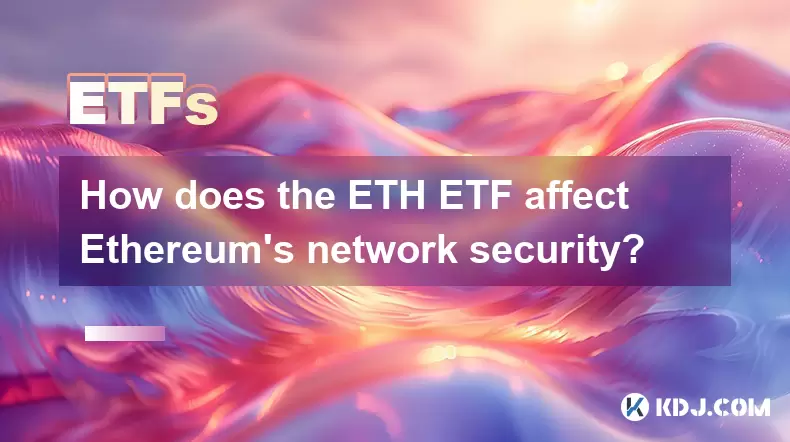
How does the ETH ETF affect Ethereum's network security?
Jul 17,2025 at 01:29pm
Understanding the ETH ETF ConceptAn Ethereum Exchange-Traded Fund (ETH ETF) is a financial product that allows investors to gain exposure to Ethereum ...
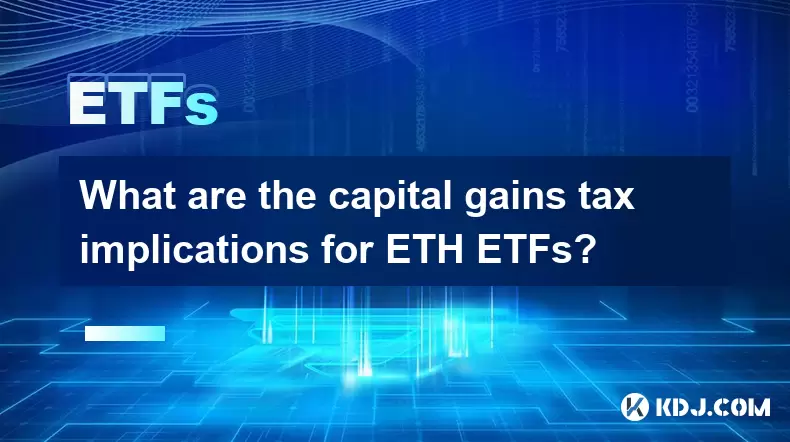
What are the capital gains tax implications for ETH ETFs?
Jul 18,2025 at 08:00am
Understanding Capital Gains Tax in Cryptocurrency InvestmentsCapital gains tax is a tax imposed on the profit realized from the sale of an asset that ...
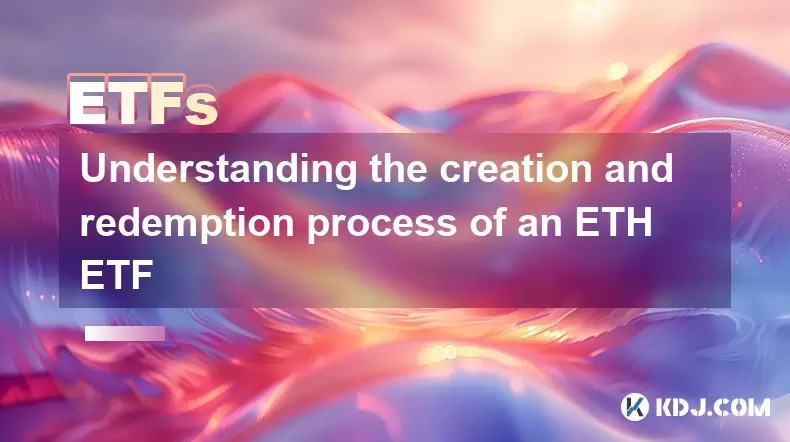
Understanding the creation and redemption process of an ETH ETF
Jul 19,2025 at 07:36am
What is an ETH ETF?An ETH ETF (Ethereum Exchange-Traded Fund) is a financial product designed to track the price of Ethereum without requiring investo...

How to analyze which ETH ETF is the best choice
Jul 19,2025 at 05:01pm
Understanding ETH ETFs and Their RelevanceEthereum Exchange-Traded Funds (ETFs) have emerged as a popular investment vehicle for those seeking exposur...
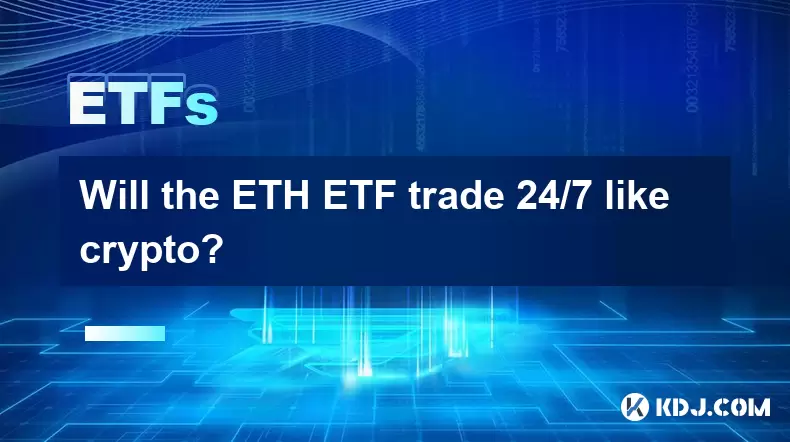
Will the ETH ETF trade 24/7 like crypto?
Jul 18,2025 at 10:00am
Understanding the ETH ETF and Its Trading HoursThe Ethereum Exchange-Traded Fund (ETH ETF) is a financial product that allows investors to gain exposu...
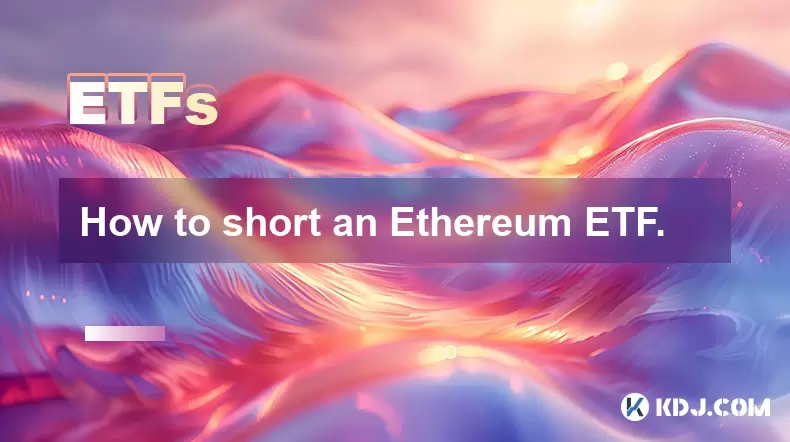
How to short an Ethereum ETF.
Jul 17,2025 at 05:43pm
Understanding the Concept of Shorting an Ethereum ETFShorting an Ethereum ETF involves betting against the price of Ethereum through a specific exchan...

How does the ETH ETF affect Ethereum's network security?
Jul 17,2025 at 01:29pm
Understanding the ETH ETF ConceptAn Ethereum Exchange-Traded Fund (ETH ETF) is a financial product that allows investors to gain exposure to Ethereum ...

What are the capital gains tax implications for ETH ETFs?
Jul 18,2025 at 08:00am
Understanding Capital Gains Tax in Cryptocurrency InvestmentsCapital gains tax is a tax imposed on the profit realized from the sale of an asset that ...

Understanding the creation and redemption process of an ETH ETF
Jul 19,2025 at 07:36am
What is an ETH ETF?An ETH ETF (Ethereum Exchange-Traded Fund) is a financial product designed to track the price of Ethereum without requiring investo...

How to analyze which ETH ETF is the best choice
Jul 19,2025 at 05:01pm
Understanding ETH ETFs and Their RelevanceEthereum Exchange-Traded Funds (ETFs) have emerged as a popular investment vehicle for those seeking exposur...

Will the ETH ETF trade 24/7 like crypto?
Jul 18,2025 at 10:00am
Understanding the ETH ETF and Its Trading HoursThe Ethereum Exchange-Traded Fund (ETH ETF) is a financial product that allows investors to gain exposu...

How to short an Ethereum ETF.
Jul 17,2025 at 05:43pm
Understanding the Concept of Shorting an Ethereum ETFShorting an Ethereum ETF involves betting against the price of Ethereum through a specific exchan...
See all articles

























































































